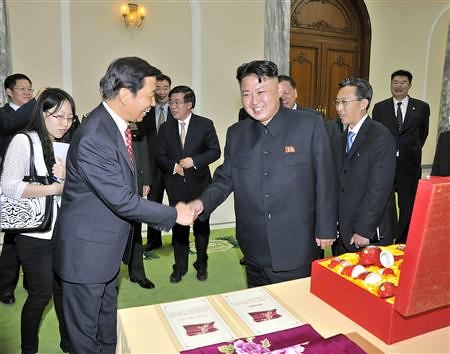
DPRK leader Kim Jong Un with People's Republic of China Vice-President Li Yuanchao. The Chinese official is in the country to commemorate the 60th anniversary of the armstice., a photo by Pan-African News Wire File Photos on Flickr.
China rejects UN’s ‘unreasonable criticism’
February 19, 2014
BEIJING/SEOUL. — A senior Chinese official has strongly rejected an “unreasonable criticism” of Beijing in a new UN report on human rights violations in the Democratic People’s Republic of Korea.
The remarks come after UN investigators said Beijing might be “aiding and abetting crimes against humanity” by sending DPRK defectors back to Pyongyang. The Chinese government has long portrayed DPRK defectors as criminals or economic migrants.
“Of course we cannot accept this unreasonable criticism,” Chinese Foreign Ministry spokeswoman Hua Chunying said at a Press briefing in Beijing yesterday, adding, “We believe that politicising human rights issues is not conducive towards improving a country’s human rights.”
The developments come after the UN report said DPRK leaders should be prosecuted for grossly violating the rights of the nation.
The Beijing government says it will oppose any attempt to refer the DPRK leadership to the International Criminal Court (ICC).
China also says sending the report to The Hague will not resolve human rights situation. Beijing has instead called for resolving the issue through constructive dialog.
“We believe that taking human rights issues to the International Criminal Court is not helpful to improving a country’s human rights situation,” Hua noted.
However, the Pyongyang government has rejected the report, saying it is part of a hostile policy against the country and violations mentioned in it do not exist.
The DPRK government also called the report a political plot by the EU and Japan in alliance with the US, which has a hostile policy toward the Asian country.
Pyongyang has pledged to respond to any attempt of regime change under the pretext of human rights protection.
Senior DPRK officials have often accused Washington of plotting with regional allies to topple the country’s government.
Meanwhile, South Korea yesterday officially launched “the Korean Peninsula Club”, a dialogue mechanism involving 21 countries, to strengthen international communication and cooperation on issues about the DPRK ahead of the upcoming family reunion between the two sides, South Korea’s Foreign Ministry said yesterday.
Diplomats from 21 foreign embassies stationed in Seoul, including Australia, Canada, the European Union, Finland, Italy, Mexico and Turkey, attended the opening ceremony of the club held in the building of the Foreign Ministry.
At the ceremony, South Korea’s Foreign Ministry explained its recent policies towards DPRK, while foreign diplomats gave their comments and suggestions about dealing with the DPRK issues.
The foreign ministry said the ambassadors will have chances to visit the DPRK for meeting with its officials and citizens at least twice a year, which will help them to know more about the current situation of the country.
It is expected to serve as a venue to get useful assessments and advice on the DPRK, which would come from their hands-on experiences and direct contacts with DPRK officials, a senior Foreign Ministry official was quoted by Yonhap news agency as saying.
He added that it was also a chance to boost foreign diplomats’ understanding of Seoul’s key policies on Pyongyang and ask for support from the international community.
Cho Tae-yong, South Korea’s chief envoy on DPRK issue, will hold the regular meetings of the club, the ministry said, adding that members of the club will get together when needed.
Seoul’s Foreign Ministry is also considering establishing another similar consultative body comprised of China, Russia, German, UK and other countries which have separate establishments in Pyongyang.
— Press TV/Xinhua.
No comments:
Post a Comment